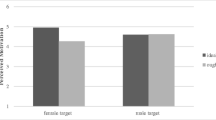Abstract
Although Response Styles Theory posits gender differences in ruminative thought related to depression, evidence of these differences resides largely in self-report data, leading us to hypothesize that stereotyping may influence women’s perceived rumination. In an online survey with 94 U.S. Midwestern college women and 74 men, the re-affirmed relationship between gender and rumination (such that women reported higher levels than men) was moderated by general stereotype acceptance and endorsement of traditional roles for women (benevolent sexism). Only for women were stereotype acceptance and benevolent sexism positively related to perceived rumination, suggesting that rumination may be reported most by women who believe it to be a gender-appropriate response and raising questions about the robustness of gender differences in actual rumination.



Similar content being viewed by others
References
Butler, L. D., & Nolen-Hoeksema, S. (1994). Gender differences in responses to depressed mood in a college sample. Sex Roles, 30, 331–346.
Carroll, M. P. (1998). But fingerprints don’t lie, eh?: Prevailing gender ideologies and scientific knowledge. Psychology of Women Quarterly, 22, 739–749.
Carter, J. D., Hall, J. A., Carney, D. R., & Rosip, J. C. (2006). Individual differences in the acceptance of stereotyping. Journal of Research in Personality, 40, 1103–1118.
Conway, M., Alfonsi, G., Pushkar, D., & Giannopoulos, C. (2008). Rumination on sadness and dimensions of communality and agency: Comparing White and visible minority individuals in a Canadian context. Sex Roles, 58, 738–749.
Davis, R. N., & Nolen-Hoeksema, S. (2000). Cognitive inflexibility among ruminators and nonruminators. Cognitive Therapy and Research, 24, 699–711.
Deaux, K., & Major, B. (1987). Putting gender into context: An interactive model of gender-related behavior. Psychological Bulletin, 94, 369–389.
Fischer, A. R. (2006). Women’s benevolent sexism as a reaction to hostility. Psychology of Women Quarterly, 30, 410–416.
Glick, P., & Fiske, S. T. (1996). The ambivalent sexism inventory: Differentiating hostile and benevolent sexism. Journal of Personality and Social Psychology, 70, 491–512.
Glick, P., & Fiske, S. T. (2001). An ambivalent alliance: Hostile and benevolent sexism as complementary justifications for gender inequality. The American Psychologist, 56, 109–118.
Hatzenbuehler, M. L., Dovidio, J. F., Nolen-Hoeksema, S., & Phills, C. E. (2009). An implicit measure of anti-gay attitudes: Prospective associations with emotion regulation strategies and psychological distress. Journal of Experimental Social Psychology, 45, 1316–1320.
Hegarty, P., & Pratto, F. (2004). The differences that norms make: Empiricism, social constructionism, and the interpretation of group differences. Sex Roles, 50, 445–453.
Hoffmann, M. L., Powlishta, K., & White, K. J. (2004). An examination of gender differences in adolescent adjustment: The effect of competence on gender role differences in symptoms of psychopathology. Sex Roles, 50, 795–810.
Hyde, J. S. (2005). The gender similarities hypothesis. The American Psychologist, 60, 581–592.
Ickes, W., Gesn, P. R., & Graham, T. (2000). Gender differences in empathetic accuracy: Differential ability or differential motivation? Personal Relationships, 7, 95–109.
Jose, P. E., & Brown, I. (2008). When does the gender difference in rumination begin? Gender and age differences in the use of rumination by adolescents. Journal of Youth and Adolescence, 37, 180–192.
LaFrance, M., Paluck, E. L., & Brescoll, V. (2004). Sex changes: A current perspective on the psychology of gender. In A. H. Eagly, A. E. Beall, & R. J. Sternberg (Eds.), The psychology of gender (2nd ed., pp. 328–344). New York: Guilford.
Landrine, H. (1988). Depression and stereotypes of women: Preliminary empirical analyses of the gender-role hypothesis. Sex Roles, 19, 527–541.
Lyubomirsky, S., & Nolen-Hoeksema, S. (1995). Self-perpetuating properties of dysphoric rumination. Journal of Personality and Social Psychology, 69, 176–190.
Lyubomirsky, S., Kasri, F., & Zehm, K. (2003). Dysphoric rumination impairs concentration on academic tasks. Cognitive Therapy and Research, 27, 309–330.
Mezulis, A. H., Abramson, L. Y., & Hyde, J. S. (2002). Domain specificity of gender differences in rumination. Journal of Cognitive Psychotherapy, 16, 421–434.
Morrison, R., & O’Connor, C. (2005). Predicting psychological distress in college students: The role of rumination and stress. Journal of Clinical Psychology, 61, 447–460.
Morrow, J., & Nolen-Hoeksema, S. (1990). Effects of responses to depression on the remediation of depressive affect. Journal of Personality and Social Psychology, 58, 519–527.
Nolen-Hoeksema, S. (1987). Sex differences in unipolar depression: Evidence and theory. Psychological Bulletin, 101, 259–282.
Nolen-Hoeksema, S. (1991). Responses to depression and their effects on the duration of depressive episodes. Journal of Abnormal Psychology, 100, 569–582.
Nolen-Hoeksema, S., & Jackson, B. (2001). Mediators of the gender difference in rumination. Psychology of Women Quarterly, 25, 37–47.
Nolen-Hoeksema, S., & Morrow, J. (1991). A prospective study of depression and posttraumatic stress symptoms after a natural disaster: The 1989 Loma Prieta earthquake. Journal of Personality and Social Psychology, 61, 115–121.
Nolen-Hoeksema, S., & Morrow, J. (1993). Effects of rumination and distraction on naturally occurring depressed mood. Cognition & Emotion, 7, 561–570.
Nolen-Hoeksema, S., Morrow, J., & Fredrickson, B. L. (1993). Response styles and the duration of episodes of depressed mood. Journal of Abnormal Psychology, 102, 20–28.
Nolen-Hoeksema, S., Larson, J., & Grayson, C. (1999). Explaining the gender difference in depressive symptoms. Journal of Personality and Social Psychology, 77, 1061–1072.
Nolen-Hoeksema, S., Wisco, B. E., & Lyubomirsky, S. (2008). Rethinking rumination. Perspectives on Psychological Science, 3, 400–424.
Rusting, C. L., & Nolen-Hoeksema, S. (1998). Regulating responses to anger: Effects of rumination and distraction on angry mood. Journal of Personality and Social Psychology, 74, 790–803.
Stewart, A. J., & McDermott, C. (2004). Gender in psychology. Annual Review of Psychology, 55, 519–544.
Treynor, W., Gonzalez, R., & Nolen-Hoeksema, S. (2003). Rumination reconsidered: A psychometric analysis. Cognitive Therapy and Research, 27, 247–259.
Yoder, J. D., & Kahn, A. S. (2003). Making gender comparisons more meaningful: A call for more attention to social context. Psychology of Women Quarterly, 27, 281–290.
Yoder, J. D., Tobias, A., & Snell, A. (2009, August). The personal and political sides of undergraduate women’s feminist identification. Poster session presented at the meeting of the American Psychological Association, Toronto.
Zalta, A. K., & Chambless, D. L. (2008). Exploring sex differences in worry with a cognitive vulnerability model. Psychology of Women Quarterly, 32, 469–482.
The authors thank Leah Lindenbaum for her prior work on rumination; Andrea Snell and John Zipp for their statistical advice; and Jessica Headley for her editing
Author information
Authors and Affiliations
Corresponding author
Rights and permissions
About this article
Cite this article
Yoder, J.D., Lawrence, C.L. Are Gender Differences in Self-Reported Rumination Explained by Women’s Stereotyping?. Sex Roles 65, 94–101 (2011). https://doi.org/10.1007/s11199-010-9913-0
Published:
Issue Date:
DOI: https://doi.org/10.1007/s11199-010-9913-0




